
The Landtag of Hesse is the unicameral parliament of the State of Hesse in the Federal Republic of Germany. It convenes in the Stadtschloss in Wiesbaden. As a legislature it is responsible for passing laws at the state level and enacting the budget. Its most important function is to elect and control the state government. The constitution of the State of Hesse describes the role of the Landtag in sections 75 to 99.

The 2009 Schleswig-Holstein state election was held on 27 September 2009 to elect the members of the Landtag of Schleswig-Holstein. It was held on the same day as the 2009 federal election and the 2009 Brandenburg state election.
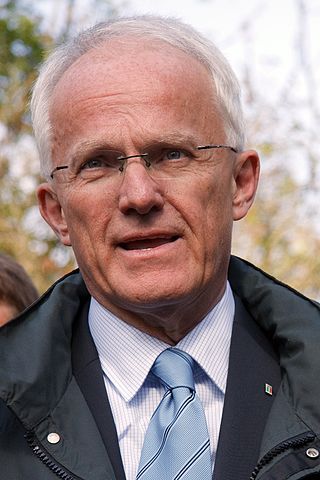
The 2010 North Rhine-Westphalia state election was held on 9 May 2010 to elect the 15th Landtag of North Rhine-Westphalia. The outgoing government was a coalition of the Christian Democratic Union (CDU) and Free Democratic Party (FDP) led by Minister-President Jürgen Rüttgers.

The 1995 North Rhine-Westphalia state election was held on 14 May 1995 to elect the 12th Landtag of North Rhine-Westphalia. The outgoing government was a majority of the Social Democratic Party (SPD), led by Minister-President Johannes Rau.

The 2013 Bavarian state election was held on 15 September 2013 to elect the 180 members of the 17th Landtag of Bavaria. It was held one week before the 2013 German federal election. The CSU regained the absolute majority it had lost in 2008, while the Free Democratic Party (FDP), a member of the outgoing governing coalition, fell below the 5% electoral threshold and lost all its seats. Minister-President Horst Seehofer continued in office.
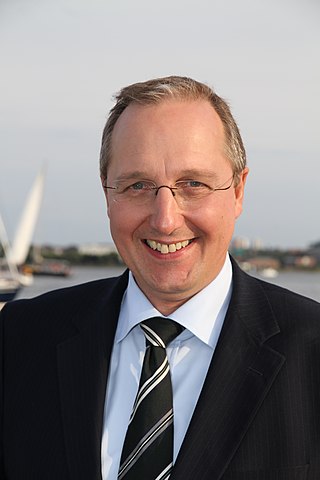
The 2012 Schleswig-Holstein state election was held on 6 May 2012 to elect the members of the Landtag of Schleswig-Holstein. The incumbent coalition government of the Christian Democratic Union and Free Democratic Party (FDP) was defeated. Though the CDU remained the largest party, the Social Democratic Party (SPD) negotiated a coalition with The Greens and the South Schleswig Voters' Association (SSW). This was dubbed the "Danish traffic light" or "Namibia coalition". SPD leader Torsten Albig was subsequently elected Minister-President by the Landtag.

The 2016 Baden-Württemberg state election was held on 13 March 2016 to elect the members of the 15th Landtag of Baden-Württemberg. The incumbent government of The Greens and the Social Democratic Party (SPD) led by Minister-President Winfried Kretschmann lost its majority.

The 2016 Saxony-Anhalt state election was held on 13 March 2016 to elect the members of the 7th Landtag of Saxony-Anhalt. The incumbent grand coalition of the Christian Democratic Union (CDU) and Social Democratic Party (SPD) led by Minister-President Reiner Haseloff lost its majority. The Alternative for Germany (AfD) debuted at 24.3%, with every other parliamentary party recording losses, particularly the SPD and The Left.

The 2022 Saarland state election was held on 27 March 2022 to elect the 17th Landtag of Saarland. The outgoing government was a coalition of the Christian Democratic Union (CDU) and Social Democratic Party (SPD) led by Minister-President Tobias Hans.

The 2019 Brandenburg state election was held on 1 September 2019 to elect the members of the 7th Landtag of Brandenburg. It took place on the same day as the 2019 Saxony state election. The outgoing government was a coalition of the Social Democratic Party (SPD) and The Left, led by Minister-President Dietmar Woidke.

The 2019 Thuringian state election was held on 27 October 2019 to elect the members of the 7th Landtag of Thuringia. The outgoing government was a coalition consisting of The Left, the Social Democratic Party (SPD), and The Greens, led by Minister-President Bodo Ramelow.
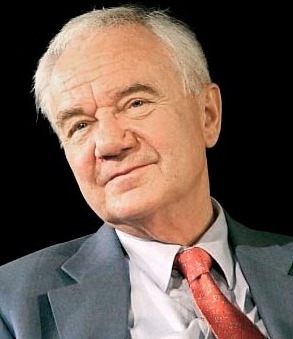
The 1990 Brandenburg state election was held on 14 October 1990 to elect the members of the first Landtag of Brandenburg. It was the first election held in Brandenburg since the reunification of Germany, which took place on 3 October. The Social Democratic Party (SPD) led by Manfred Stolpe emerged as the largest party with 38.2% of the vote, followed by the Christian Democratic Union (CDU) with 29.6%. The SPD subsequently formed Germany's first traffic light coalition with the Free Democratic Party (FDP) and Alliance 90, and Stolpe became Brandenburg's first post-reunification Minister-President.

The 2021 Baden-Württemberg state election was held on 14 March 2021 to elect the 17th Landtag of Baden-Württemberg. The outgoing government was a coalition of Alliance 90/The Greens and the Christian Democratic Union (CDU) led by Minister-President Winfried Kretschmann.
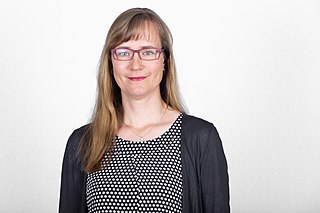
The 2021 Saxony-Anhalt state election was held on 6 June 2021 to elect the 8th Landtag of Saxony-Anhalt. The outgoing government was coalition of the Christian Democratic Union (CDU), Social Democratic Party (SPD), and The Greens, led by Minister-President Reiner Haseloff.

The 2021 Rhineland-Palatinate state election was held on 14 March 2021 to elect the 18th Landtag of Rhineland-Palatinate. The outgoing government was a "traffic light coalition" of the Social Democratic Party (SPD), Free Democratic Party (FDP), and The Greens led by Minister-President Malu Dreyer.
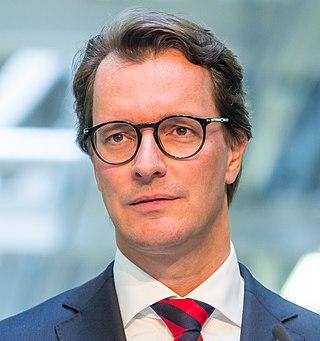
The 2022 North Rhine-Westphalia state election was held on 15 May 2022 to elect the 18th Landtag of North Rhine-Westphalia. The outgoing government was a coalition of the Christian Democratic Union (CDU) and Free Democratic Party (FDP) led by Minister-President Hendrik Wüst.
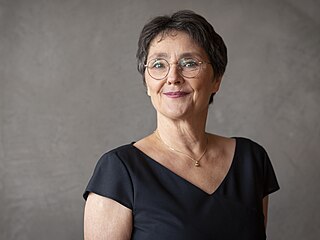
The 2022 Schleswig-Holstein state election was held on 8 May 2022 to elect the 20th Landtag of Schleswig-Holstein. The outgoing government was a coalition of the Christian Democratic Union (CDU), The Greens, and the Free Democratic Party (FDP), led by Minister-President Daniel Günther.

The 2022 Lower Saxony state election was held on 9 October 2022 to elect the 19th Landtag of Lower Saxony. The incumbent government was a coalition of the Social Democratic Party of Germany (SPD) and Christian Democratic Union of Germany (CDU) led by Minister-President Stephan Weil.

The Third Woidke cabinet is the current state government of Brandenburg, sworn in on 20 November 2019 after Dietmar Woidke was elected as Minister-President of Brandenburg by the members of the Landtag of Brandenburg. It is the 9th Cabinet of Brandenburg.
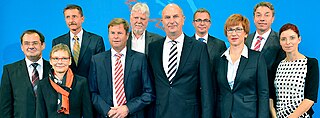
The Second Woidke cabinet was the state government of Brandenburg between 2014 and 2019, sworn in on 5 November 2014 after Dietmar Woidke was elected as Minister-President of Brandenburg by the members of the Landtag of Brandenburg. It was the 8th Cabinet of Brandenburg.
This page is based on this
Wikipedia article Text is available under the
CC BY-SA 4.0 license; additional terms may apply.
Images, videos and audio are available under their respective licenses.




















